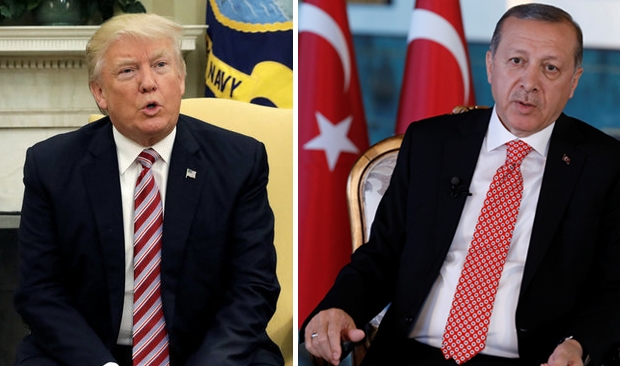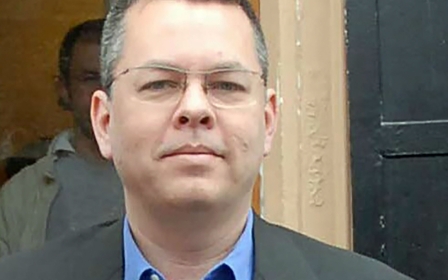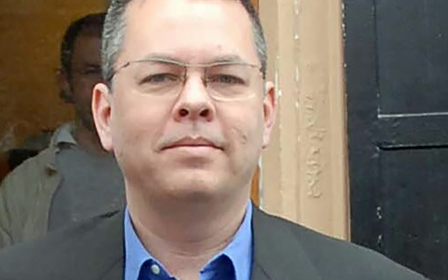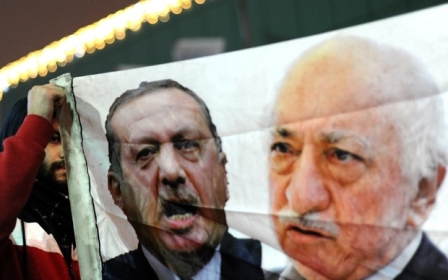Trump threatens Turkey with sanctions if it does not release US pastor

Donald Trump and his vice president, Mike Pence, both threatened Turkey with sanctions on Thursday if Ankara does not release US pastor Andrew Brunson, who is under house arrest.
"The United States will impose large sanctions on Turkey for their long time detainment of Pastor Andrew Brunson, a great Christian, family man and wonderful human being," the US president wrote on Twitter. "He is suffering greatly. This innocent man of faith should be released immediately!"
Turkey responded by rebuking the US, stressing that Brunson's case is in the hands of the country's "independent judiciary".
However, the escalation appears to have stopped after Turkish Foreign Minister Mevlut Cavusoglu spoke with US Secretary of State Mike Pompeo later on Thursday.
Speaking at the Ministerial to Advance Religious Freedom, Pence described Brunson's incarceration as an act of "religious persecution".
"If Turkey does not take immediate action to free innocent man of faith and send him home to America, then the United States will impose significant sanctions until Pastor Brunson is free," said Pence during his address.
"To President Erdogan and his government, I have a message from the United States of America: Release Pastor Andrew Brunson now or be prepared to face the consequences."
In response to Pence's announcement, Cavusoglu said that Ankara would not "tolerate threats from anybody".
"No one dictates Turkey. We will never tolerate threats from anybody," Cavusoglu posted on Twitter. "Rule of law is for everyone; no exception."
Turkish presidential spokesman Ibrahim Kalin also added to Cavusoglu's comments, saying that Washington's "use of threatening language against Turkey, a NATO ally, is unacceptable".
"The US administration, which has taken no steps whatsoever against the terrorist group FETO until today, must understand that it cannot reach desired results by threatening Turkey over an issue, which falls within the jurisdiction of the country's independent judiciary," Kalin said in a statement.
"The United States must reconsider its approach and adopt a constructive position before inflicting further damage to its own interests and its alliance with Turkey."
On Wednesday, Brunson was released from prison and placed under house arrest after being detained in October 2016 for allegedly aiding the outlawed Gulen movement.
Ankara blames US-based cleric Fethullah Gulen for a failed coup that rocked Turkey in 2016. Gulen denies any involvement in the coup, in which at least 250 people were killed.
Brunson ran a Protestant church in the city of Izmir and was one of the hundreds of people swept up in arrests by Turkey following the coup attempt.
Pence welcomed Turkey's decision to place Brunson under house arrest, but said it was "not good enough".
Pompeo also had said that there was "no credible evidence" against Brunson and called on "Turkish authorities to resolve his case immediately in a transparent and fair manner".
Turkey's case against Brunson has further strained its relationships with the US.
Earlier this month, Washington rejected proposals by Turkey to release Brunson in exchange for extraditing Gulen.
The two issues added to the tensions between the NATO allies, which are already facing disputes over Syria and the detention of two Turkish US diplomatic mission staffers.
In September, Turkish President Recep Tayyip Erdogan suggested that Turkey could free Brunson if Washington handed over Gulen in a swap deal.
"Give him [Gulen] to us, and we will try [Brunson] and give him back," Erdogan said then.
New MEE newsletter: Jerusalem Dispatch
Sign up to get the latest insights and analysis on Israel-Palestine, alongside Turkey Unpacked and other MEE newsletters
Middle East Eye delivers independent and unrivalled coverage and analysis of the Middle East, North Africa and beyond. To learn more about republishing this content and the associated fees, please fill out this form. More about MEE can be found here.




